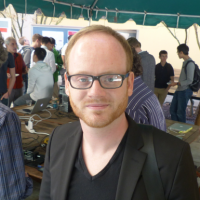SystemX Affiliates: login to view related content.

What if your mobile phone’s display would correct your vision deficiency instead of your glasses? Light field display technology can assess and correct the user’s vision. In this talk, we discuss a wide range of unconventional applications that are facilitated by light field technology, a novel inexpensive computational display technology. Light field displays are expected to be “the future of 3D displays”, although many believe that the recent hype about stereoscopic 3D displays is over. One reason why the consumers haven’t widely adopted 3D television can be the lack of a unique or useful enhancement of the 2D viewing experience. Wetzstein discusses why it is believed that a new technology - light field displays - delivering an experience that consumers haven’t adopted in the past will work in the future. The talk begins with a short historical review of light field displays and recent trends towards compressive light field display, followed by a discussion of applications in projection systems, vision assessment and correction, wearable displays, and a brief comparison to holography.
Prior to joining Stanford University's Electrical Engineering Department as an Assistant Professor in 2014, Gordon Wetzstein was a Research Scientist in the Camera Culture Group at the MIT Media Lab. His research focuses on computational imaging and display systems as well as computational light transport. At the intersection of computer graphics, machine vision, optics, scientific computing, and perception, this research has a wide range of applications in next-generation consumer electronics, scientific imaging, human-computer interaction, remote sensing, and many other areas. Gordon's cross-disciplinary approach to research has been funded by DARPA, NSF, Samsung, Intel, and other grants from industry sponsors and research councils. In 2006, Gordon graduated with Honors from the Bauhaus in Weimar, Germany, and he received a Ph.D. in Computer Science from the University of British Columbiain 2011. His doctoral dissertation focuses on computational light modulation for image acquisition and display and won the Alain Fournier Ph.D. Dissertation Annual Award. He organized the IEEE 2012 and 2013 International Workshops on Computational Cameras and Displays, founded displayblocks.org as a forum for sharing computational display design instructions with the DIY community, and presented a number of courses on Computational Displays and Computational Photography at ACM SIGGRAPH. Gordon won best paper awards at the International Conference on Computational Photography (ICCP) in 2011 and 2014 as well as a Laval Virtual Award in 2005.
Questions about this series? Please Contact Us.


